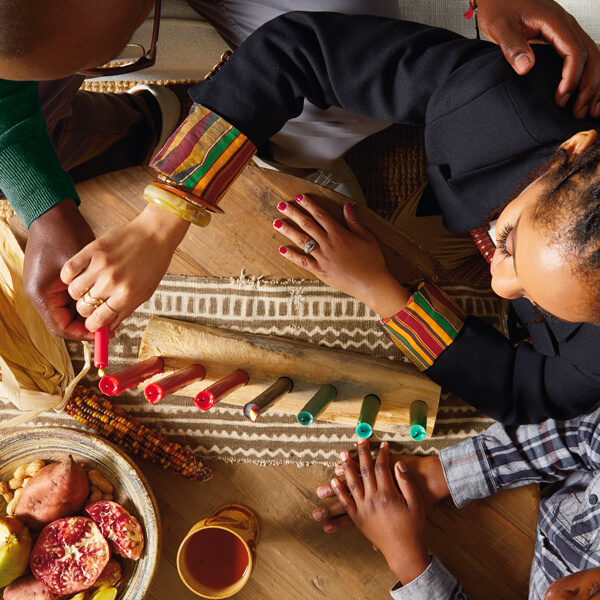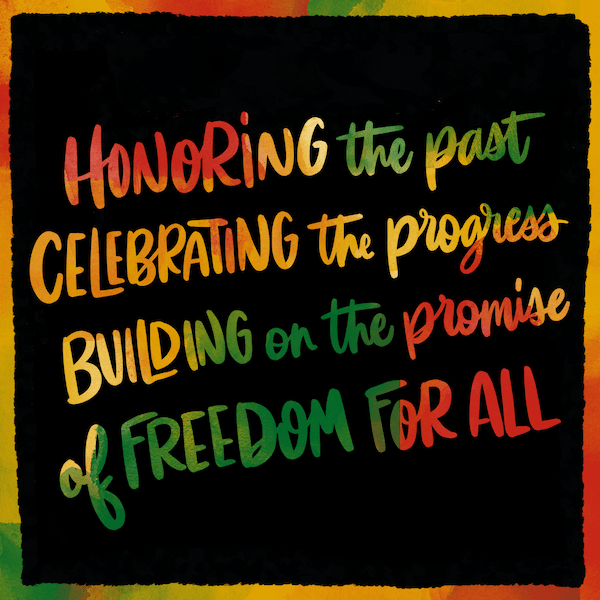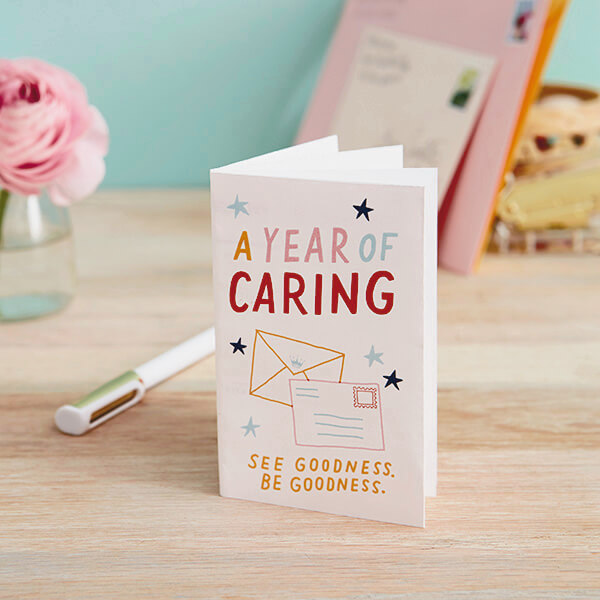Why and How to Show You Care

From giving up your seat to a stranger who needs to sit down to bringing food to a friend or sitting with an ill parent, we’ve all had our moments of caring. And it’s likely you know someone who seems to live and breathe empathy and caring— you may even be that someone.
But what motivates any one of us to care about others? And of all the ways there are to care for people, why do we choose one way over another?
Because of recent events, this article has been updated. Look for new tips throughout in gray.
Inspired? Create and share by tagging @Hallmark.
We evolved to care for others
Science tells us that as a species, we evolved into more caring human beings—if we hadn’t, we wouldn’t have survived.
Alone, we were no match for the forces of nature. Raising and protecting babies who took years to mature required a collective effort. Our growing ability to cooperate and recognize when others needed help allowed us to work together at the business of surviving and, ultimately, to thriving. Taking care of each other is what got us here and it’s an innate part of who we are.
Even now, in the few remaining collaborative societies not based on money, everything is shared with everyone. No one is entitled to more resources than anyone else, and everyone is fed and cared for regardless of their ability to contribute. In these societies, taking care of others is the best way to ensure everyone will thrive.
We learned to keep caring
Today we could choose to avoid a great deal of direct human collaboration and connection. So why do we still care for others? What makes us want to be helpful to someone else, even if there’s nothing obvious in it for us? The answers are varied and wonderful.
Many people credit their parents, especially their mothers, as their inspiration. They were shown and told caring for others was the right thing to do.
As humans, we thrive when we have a strong sense of belonging to a group, and when we feel a connection to something bigger than ourselves. We suffer when we feel we don’t belong or we don’t feel connected. By caring for others we can experience a sense of purpose, fulfill a higher calling, and find our own place to belong.
And while much of the motivation for caring people report is altruistic—it’s simply what we are called to do—there are rewards: Caring for others feels good. It’s fulfilling. It improves our quality of life.
Feeling like we don’t belong can lead to depression, anxiety, and withdrawal, so the simple act of paying attention to one another remains a vital act of caring. When we feel heard we feel understood and can then better connect with someone else.
We care for others in different ways
When it comes to how we care, the ways we do it are as individual as we are. Some of us most enjoy giving or receiving gifts. For others, simply spending time with a friend or a loved one is enough to fill their tank. Performing unbidden acts of service says, “I care about you” without uttering a word. We can help lighten another’s load through shared laughter, a helping hand, or an out of the blue kindness.
Taking the time to listen deeply can make a difference in our sped-up world. Remembering important things about each other—their kids’ names, their vacation plans, their favorite shows—and asking about them the next time you talk, goes a long way towards making someone feel known and that they are important to you.
Caring, while often a very personal exchange, can also be exhibited by supporting causes through donations of time or money. Pitching in on a group effort can magnify the effects of your caring efforts and impact people’s lives in effective and even life-changing ways.
And, of course, there’s food! Making your family’s favorite dish, delivering food to a neighbor in good times and tough ones, and leaving small treats on a co-worker’s desk can all help nourish relationships in more ways than one.
Many are familiar with the five love languages and the different ways we give and receive love. While “physical touch” might be in shorter supply these days, there are many ways to give quality time, even if it’s only virtual/digital. And opportunities for giving gifts and performing acts of service and affirmation are popping up every minute. Keep an eye out for ways to donate time and attention to help those who need it the most right now.
Caring is who we are
It’s how we flourish. And it can be personally validating to be known as a caring person. We feed our own need for meaning and recognition as we help fill the needs of others. There’s really no downside to thoughtful caring—and the benefits are profound.
Remember that tough times can bring out the best in us. And even though we might not gather in person as often, there are many ways to be together—even from a distance.
You may also like
See more-
Christmas Sweet dreams, Santa!
Catch Santa napping on the job with this Snoring Santa Keepsake Ornament featuring sound and motion. With every snore...
-
Kwanzaa What is Kwanzaa?
What is Kwanzaa? A festival of lights rich in African symbolism, it takes place each year from December 26th through ...
-
Christmas Advent calendar activities for adventurous families
It’s time to start the countdown. Maybe it’s about being mindful…or counting your blessings…or preempting your kids a...
-
Summer Ways to celebrate Juneteenth
While Juneteenth was officially recognized as a federal holiday in 2021, this pivotal moment in history has been cele...
-
Christmas Christmas and Kwanzaa: Keeping family holiday traditions and finding your own
Whether you’re single or starting a family, religious or agnostic, someone who celebrates Christmas and Kwanzaa or ju...
-
Halloween Make ghosts and goblins feel right at home this Halloween
Light up your home with haunting Halloween seasonal decor. 🎃👻 Shop now at Hallmark Gold Crown stores or at Hallmark.com.
-
Halloween No scaredy cats around here!
When this black cat crosses your path, you know fun can't be far behind. 😻 🧙♀️ Shop the Zip-A-Long Cat in Hallmark G...
-
Halloween While you’re waiting for The Great Pumpkin this Halloween…
Fly around the pumpkin patch with Zip-a-long Snoopy! 🎃 Shop more frightening finds in Hallmark Gold Crown stores and ...
-
Halloween Light up the night with frightful fun!
Could it be? Could it be!? Yes it is! It’s the Peanuts® Snoopy and Woodstock Halloween figurine! 🎃 🐶 Find it and more...
-
Halloween Where cozy meets mischief and magic
Make some magic this Halloween with this Hocus Pocus hooded blanket. 🧙♀️👻Find more Halloween essentials in Hallmark ...
-
Gifting Relive a favorite from your childhood!
Fill your home with a few small joys inspired by Disney’s “It’s a Small World” 🩵🎎 Shop the collection at Hallmark Gol...
-
Halloween Which house will you be sorted into?
The Harry Potter™ Sorting Hat™ Mug plays sound whenever you lift the lid. Find this chatty mug in Hallmark Gold Crown...
-
Encouragement How to support caregivers
It’s often hard to know how to support a caregiver. Most caregiving checklists out there hit the major topics like me...
-
Love 50 different ways to say I love you
You don’t need to wait for a special occasion to remind that certain someone how much he or she is loved. Spice up yo...
-
Graduation 15 graduation quotes
Celebrate your favorite grad’s milestone with the wit and wisdom of Hallmark writers, fans and others. We’ve rounded ...
-
Congratulations How to congratulate someone
Congratulating others is easy and fun, right? Like when your friend worked really hard and got that awesome job makin...
-
Care & Concern Be more caring with a kindness journal
It's obvious the world could use more kindness. So this year, why not make "be more caring" your number one resolutio...
-
Fall Día de Muertos: A celebration of life and love
Día de Muertos, Day of the Dead, is a holiday originally celebrated in the southern and central parts of Mexico and i...
-
Card Ideas Card messages for kids: What to write in a kid’s holiday card and more
My 3-year-old was having a hard time at preschool drop-off. Dragging his feet. Asking to stay home. This went on a fe...
-
Christmas 6 Creative Christmas Card Display Ideas
Holiday card season is here: Our mailboxes are about to fill up with festive envelopes with pretty stamps and familia...





















